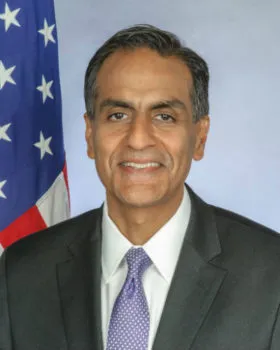Diplomatic Opportunity
On August 16, 2024, a significant diplomatic event will unfold as a high-level US delegation, led by Deputy Secretary of State Richard Verma, embarks on a visit to Nepal and India. This visit highlights the ongoing commitment of the United States to strengthen ties with these pivotal South Asian nations. The delegation’s journey is poised to foster deeper cooperation and address key bilateral and regional issues that impact both the United States and its partners in the region.
Table of Contents
Strengthening Diplomatic Relations
The visit of Deputy Secretary Richard Verma underscores the importance of maintaining and enhancing diplomatic relations between the United States, Nepal, and India. The US has historically valued its partnerships with these countries due to their strategic locations and growing influence in South Asia. By engaging with leaders and stakeholders in both nations, the delegation aims to reaffirm the US’s commitment to these relationships and explore new avenues for collaboration.
The meetings are expected to cover a broad range of topics, including trade, security, and regional stability. The US has been an active partner in promoting economic growth and development in Nepal and India. By discussing these areas, the delegation seeks to build on existing agreements and identify opportunities for further cooperation. The engagement will also provide a platform to address any challenges that may arise in the bilateral relationships.
Economic and Trade Opportunities
Economic collaboration will be a key focus of the visit. Both Nepal and India are important trade partners for the United States, and there is significant potential for enhancing economic ties. The discussions are likely to include ways to expand trade and investment opportunities, which can benefit all parties involved.
For Nepal, the visit offers a chance to explore initiatives that support its economic development goals. The US has provided aid and support to Nepal in various forms, including humanitarian assistance and development projects. By engaging with Nepali leaders, the delegation can gain insights into the country’s evolving needs and priorities, and discuss how the US can contribute to its growth.
In India, the economic dialogue is expected to delve into sectors such as technology, infrastructure, and renewable energy. India’s rapid economic growth and its role as a major player in the global economy make it a vital partner for the US. Strengthening economic ties with India can lead to mutual benefits, including increased trade, investment, and innovation.
Security and Regional Stability
Another critical aspect of the visit will be discussions on security and regional stability. The strategic importance of Nepal and India in South Asia cannot be overstated. Both countries are crucial to regional security and have key roles in addressing various challenges, including terrorism, border security, and maritime safety.
For Nepal, the focus may be on enhancing security cooperation and supporting its efforts to maintain stability in the region. The US has been involved in various initiatives to support Nepal’s security sector, and continued dialogue can help address emerging threats and reinforce cooperative strategies.
In India, the discussions will likely touch upon broader regional security issues, including counterterrorism and maritime security. India’s strategic location and its growing military capabilities make it an essential partner in maintaining regional stability. The US-India security partnership has been robust, and the visit provides an opportunity to further strengthen this collaboration.
Regional Cooperation and Multilateral Engagement
The visit also presents an opportunity to discuss regional cooperation and multilateral engagements. Both Nepal and India play significant roles in regional organizations such as the South Asian Association for Regional Cooperation (SAARC) and the Bay of Bengal Initiative for Multi-Sectoral Technical and Economic Cooperation (BIMSTEC).
The US has shown interest in supporting regional frameworks that promote economic growth and cooperation. By engaging with leaders in Nepal and India, the delegation can discuss how the US can contribute to regional initiatives and support collaborative efforts that address common challenges.
Cultural and Educational Exchanges
In addition to political and economic discussions, the visit is likely to highlight the importance of cultural and educational exchanges. The US and South Asian nations have a rich history of academic and cultural collaboration, which fosters mutual understanding and strengthens people-to-people connections.
The delegation’s visit may include events and meetings focused on educational partnerships, scholarships, and cultural programs. These exchanges play a vital role in building long-term relationships and promoting cross-cultural understanding. By supporting such initiatives, the US demonstrates its commitment to nurturing connections beyond governmental and economic spheres.
Conclusion
The visit of Deputy Secretary Richard Verma and the US delegation to Nepal and India on August 16, 2024, marks a significant moment in strengthening diplomatic ties between the United States and these key South Asian nations. Through discussions on economic collaboration, security cooperation, regional stability, and cultural exchanges, the visit aims to reinforce existing partnerships and explore new opportunities for collaboration.
As the delegation engages with leaders and stakeholders in both countries, the outcomes of this visit are expected to contribute positively to the US-Nepal and US-India relationships. By addressing shared challenges and pursuing common goals, the visit highlights the ongoing commitment of the United States to fostering strong and mutually beneficial partnerships in South Asia.








